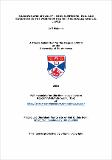Shadows and chivalry: pain, suffering, evil and goodness in the works of George MacDonald and C.S. Lewis
Abstract
This thesis argues that George MacDonald's literary influence upon C. S.
Lewis-concerning the themes of pain, suffering, evil and goodness-was
transforming and long-lasting. It is argued in the opening chapter that MacDonald's
work had a great deal to do with the change in young Lewis's imagination, helping to
convert him from a romantic doubter to a romantic believer in God and his goodness.
A review of both writers' first works suggests that such influence may have begun
earlier in Lewis's career than has been noticed. The second chapter examines how
both authors contended with the problems that pain and suffering present, and how
both understood and presented the nature of faith. Differences in their treatment of
these subjects are noted, but it is argued that these views and depictions share
fundamental elements, and that MacDonald's direct influence can be demonstrated in
particular cases. The view that MacDonald was primarily a champion of feelings is
challenged, as is the idea that either man's later writing displays a loss of faith in God
and his goodness. The third chapter, in specifically refuting the assertion that
MacDonald's view of evil was inclusive in the Jungian or dualistic sense, shows how
both authors' work maintains an unmistakable distinction between evil fortune and
moral evil. The next two chapters examine fundamental similarities in their treatment
of evil and goodness. Special care is taken in these two chapters to trace MacDonald's
direct influence, especially regarding the differences they believed existed between
hell's Pride and what they believed God to be. The fifth chapter reviews their ideas
and depictions of heaven in summing up the study's argument concerning the overall
influence of MacDonald's writing upon Lewis's imagination-in particular the change
in Lewis's understanding of the relations between Spirits, Nature, and God.
Type
Thesis, PhD Doctor of Philosophy
Collections
Items in the St Andrews Research Repository are protected by copyright, with all rights reserved, unless otherwise indicated.

